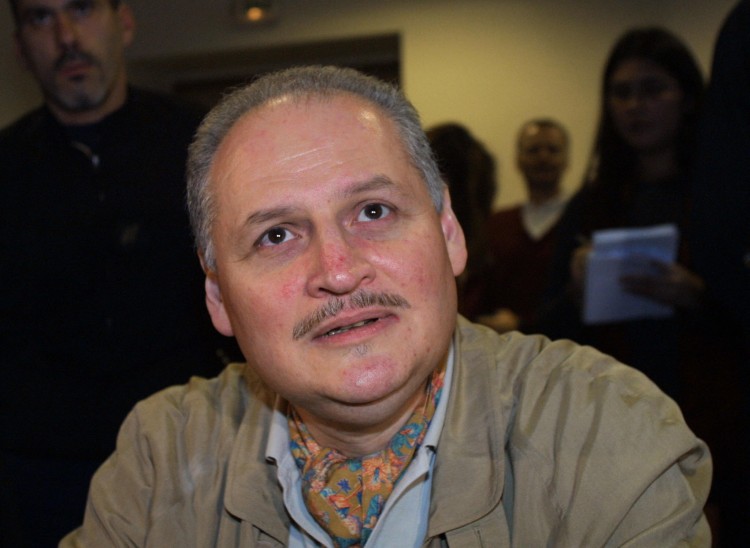In a trial in Paris, France, Ilich Ramirez Sanchez, 62, better known as “Carlos the Jackal,” was sentenced to life imprisonment late last week for organizing deadly terrorist attacks in France in the 1980s. One of the most infamous terrorists of the ‘70s and ’80s, Carlos is already serving life for three other killings in 1975.
Carlos the Jackal may not be a household name today, but in Europe at the time, he was one of the most wanted international criminals. He managed to acquire a near-mythical status, appearing in or inspiring characters in spy novels and movies. An iconic picture of him ended up on a mock-Andy Warhol album cover of British pop group Black Grape in 1995.
In reality, however, opinions differ about who he really is, what drives him, and what he has or hasn’t done. Some see him as a flamboyant terrorist playboy who exaggerates his own importance. To others, he is a cold, opportunist mercenary who carried out assassinations for dictatorial regimes for money. Others still, such as Venezuela’s controversial socialist President Hugo Chavez, extol him as a “revolutionary fighter.”
Ilich Ramirez Sanchez was born in Venezuela in 1949, to a Marxist father, who named him and his two brothers after Vladimir Ilich Ulyanov, better known as Lenin.
Ramirez was sent to Patrice Lumumba University in Moscow in the late 1960s, from where he traveled to Lebanon in 1970, joining the Popular Front for Liberation of Palestine (PFLP) and becoming involved in the Marxist organization’s guerrilla warfare against Israel and terrorist activities, such as bombings and assassinations.
He got his code name “Carlos” from his PFLP recruiter, and was dubbed “The Jackal” after a correspondent of The Guardian found Frederick Forsyth’s novel “The Day of the Jackal” near his belongings.
He gained international notoriety in 1975, when his six-person team attacked the OPEC headquarters in Vienna, taking more than 60 hostages and killing three. He was later expelled from PFLP for failing to execute high-profile hostages such as the Finance Minister of Iran. During the late ‘70s and early ’80s, Carlos lived in different parts of Europe and the Middle East.
Carlos worked as a mercenary for dictatorial regimes, such as the feared East German secret police, Stasi, as was revealed in unearthed Stasi files last year. He is believed to have attacked the Radio Free Europe offices in Munich in 1981, as well as being hired to execute Romanian dissidents for the Romanian communist government.
In 1994, he was finally apprehended in Sudan, and brought to France, where he was convicted in 1997 of the 1975 murders of two French policemen and a PFLP member, who had turned police informant. He was sentenced to life imprisonment.
Since then, Carlos married his lawyer, Isabelle Coutant-Peyre (who also defended him in this latest trial) in an unofficial ceremony. He has also converted to Islam and written several books.
Estimates of how many people Carlos killed or injured vary. Some consider him a boaster, who exaggerates the scope and success of his operations.
In the spring of 2011, he gave a rare phone interview from prison to Swedish television, where he claimed he holds the record for the highest number of operations. He further claimed responsibility for the killings of 1,500–2,000 people, and that only 10 percent of these were “innocent,” without further qualifying what he meant by the rest being “guilty” or “enemies.” More conservative estimates put his death toll over the years at roughly 80.
Former Swedish intelligence agent Gunnar Ekberg, who infiltrated PFLP and developed a close relationship with Wadie Haddad, leader of the PFLP armed wing, was quoted on his wife’s blog as saying that Haddad considered Ramirez a buffoon, who was only good for perpetrating high-profile stunts that gave the organization publicity.
This year’s trial saw him accused of four bombings in France, that killed 11 people and injured more than 100. Despite his earlier boastings, Ramirez denied involvement in this one. Throughout the trial he was defiant and mocking.
When asked if he had any last words to say in his defense, Ramirez went into a five-hour-plus diatribe about a wide range of subjects, during which he described himself as a “living martyr,” praised Osama Bin Laden as a “great man,” and delivered a tearful tribute to Moammar Gadhafi, among other things, The Guardian reported.
Three other defendants were tried in absentia. Palestinian Kamal al-Issawi and German Johannes Weinrich were also sentenced to life, while Christa-Margot Frohlich was acquitted. In 2012, Ramirez would have been eligible for conditional release. Following the new sentence, that opportunity will not come up for another 18 years.






